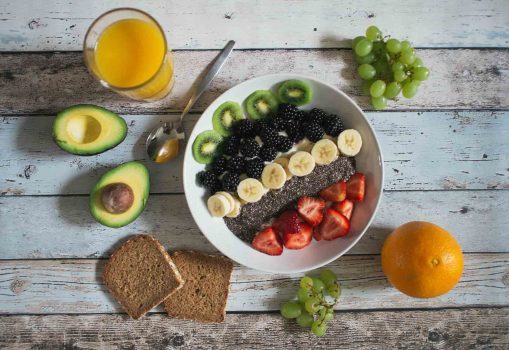
The best way to lose weight is by eating a healthy diet and exercising regularly. But, if you’re looking for an even more effective method of losing weight naturally, then there are some things that you can do.
How to Weight Loss Naturally?
Here are the top Eight ways to lose weight naturally:
- Eat More Fiber

Eating more fiber-rich foods like fruits, vegetables, whole grains, beans, nuts and seeds will help keep you full longer and prevent overeating.
Try adding these superfoods to your diet: apples, bananas, broccoli, Brussels sprouts, cabbage, carrots, cauliflower, celery, chia seeds, flaxseeds, kale, lentils, oatmeal, peas, pumpkin seeds, quinoa, spinach, strawberries, sweet potatoes, tomatoes, wheat bran, yogurt and zucchini.
- Drink Water

Drinking plenty of water throughout the day helps keep your metabolism running smoothly and keeps your body hydrated. The best way to stay hydrated is by drinking a glass of water before every meal, but you can also drink water between meals if you’re hungry.
If you are having trouble getting enough water in your diet, try adding lemon or lime slices to your water. The citric acid in these fruit wedges will increase your water intake without adding any calories.
- Get Some Exercise

Regular exercise not only burns extra calories but it also improves your mood, relieves stress and boosts energy levels. If you’re looking for a way to get more active in the New Year, here are some tips on how to start exercising regularly:
- Start small: Exercise is best when done gradually so that you don’t overdo it. Try starting with just 10 minutes of walking or light jogging three times per week. If you can do this without getting out of breath, then add another 5-10 minute walk each time. You should be able to complete these walks within 30 minutes.
- Do something you enjoy: Find activities that you like doing and stick to them. This will help keep you motivated and ensure that you continue with your workouts.
- Find an appropriate place to work out: It’s important to find somewhere where you won’t be disturbed by people or noise. A quiet room at home may be ideal. However, if you have no such space, try working out in a park or gymnasium.
- Set realistic goals: When setting fitness goals, make sure they are achievable. For example, if you want to lose weight, set yourself a goal of losing 1 pound every two weeks. If you’re trying to build muscle mass, aim to gain one pound every month.
- Don’t forget about rest days: You need to give your body time to recover from any physical activity. It’s recommended that you take at least 48 hours off after completing a workout session.
- Listen to music while you exercise: Music has been proven to increase motivation and enjoyment during exercise sessions. Choose songs that you enjoy listening to.
- Drink plenty of water: Drinking enough water keeps your muscles hydrated and prevents dehydration. Dehydration causes fatigue and soreness.
- Eat right before you exercise: Eating a healthy meal before exercising will boost your energy levels and prevent hunger pangs.
- Take breaks between sets: Taking short breaks between sets increases your endurance and improves your overall performance.
- Stretch properly: Stretching exercises your muscles and loosens tight joints. Stretches can be performed either before or after a workout.
- Add variety to your routine: Try different types of exercises to avoid boredom and maintain interest.
- Keep track of your progress: Keeping track of your progress helps motivate you to continue working out. Write down what you eat and drink, as well as your weight and measurements.
- Have fun! Enjoy your workouts and remember why you started exercising in the first place.
- Avoid Caffeine

If you want to lose weight fast, then caffeine may hinder your progress. It causes your body’s cells to store sugar instead of burn it off. So if you’re looking to cut a few pounds, then try decaf coffee or tea first.
You can also drink green tea which has been shown to have some beneficial properties for the heart and circulation system. Green tea contains catechins that are known antioxidants.
Studies show that drinking green tea regularly can help lower blood pressure and cholesterol levels in people who suffer from high blood pressure and/or cardiovascular disease.
When you start losing weight, your body is going through changes as it adjusts to working less muscle and gaining more fat. These changes affect how your brain functions, causing fatigue during exercise. Fatigue leads to an increase in hunger, so you’re likely to overeat.
This makes weight loss difficult at best and could lead to binge eating. Over time, this can cause long-term issues such as obesity and diabetes.
- Reduce Your Stress Levels

Too much stress in your life can lead to overeating which could cause you to pack on unwanted pounds. So, try to find time to relax every day.
Stress is a major factor that contributes to overeating and weight gain, according to the American Psychological Association (APA). The APA says it’s important to learn how to manage your stress levels so they don’t get out of control.
- Get Enough Sleep

Getting adequate sleep is very important for your health. It helps to regulate the hormones that control hunger and the metabolism. Sleep also plays a role in memory, mood and concentration.
The National Sleep Foundation recommends adults get seven or more hours of sleep each night. However, it’s not just about how much you sleep — it’s also about how well you sleep.
If you have trouble falling asleep at night, it may be because you are lying awake thinking about things that bother you. Try some relaxation techniques such as deep breathing, progressive muscle relaxation or meditation before bedtime.
- Avoid Alcohol

Drinking alcohol can increase your appetite and decrease the amount you burn through physical activity. Alcohol also increases your risk of heart disease, stroke, diabetes, liver problems, depression, anxiety, memory loss, sleep disorders, sexual dysfunction, accidents, violence, suicide, and cancer.
Alcohol is a depressant drug that affects how your body processes information. It slows down brain function, which makes it harder to think clearly, concentrate, make decisions, remember things, and respond appropriately in emergencies.
In addition to the health risks listed above, drinking alcohol during pregnancy may cause birth defects or miscarriage. Women who drink while pregnant should not do so until they are at least 24 weeks pregnant.
- Reduce Sugar Intake

Consuming sugary beverages can contribute to weight gain Instead, opt for calorie-free beverages like water. “I love water because it helps you feel full and boosts your metabolism without adding calories,” says Langer.
Water also has no fat or sugar content — a major bonus when trying to lose belly fat — and is inexpensive, she adds. In the UK, up to 5% of adults are underweight, while around 10% are overweight. In England, between 22% and 29% of children aged 11–15 years old are overweight.
In 2014, the Department of Health revealed that almost one in five adults (18%) were obese. This was based on a survey carried out by NHS Digital which showed that 18.5 million people had diabetes. This is higher than any other European country apart from Ireland.
Some 40% of men and 24% of women were physically inactive. The proportion of smokers stood at 19% for both sexes.
Check some total thoughts
Pros and Cons Values
Pros
- Lorem ipsum dolor sit amet
- Nunc a libero at sapien
- Nam tempus, est ac fringilla bibendum, mi dolor faucibus purus.
Cons
- Sed malesuada pharetra erat, eu viverra eros rutrum sit amet.
- Aliquam commodo auctor facilisis







